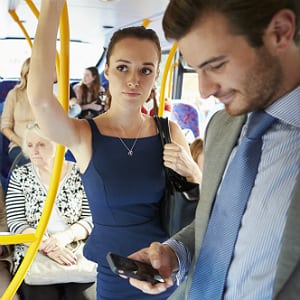Owning your own car might be a thing of the past. Learn more about recent studies on millennials brought to you by Banville Law.
At least that's what several recent studies suggest. Millennials, people who reached adolescence around the year 2000, are driving less than their parents and grandparents.
For one, AAA found that car sales among 18 to 34 year-olds fell 30% between 2007 and 2011. In 2011, people from 55 to 64 became most likely to purchase a vehicle. Just four years before, the average car buyer had been ten years younger.
Much has been made of this precipitous decline in car ownership. But explaining it has been harder. Are young people simply choosing other ways of getting around? Or are they actually traveling less?
In a recent survey conducted by Zipcar, one of America's largest ridesharing companies, respondents were asked which technology they would be least likely to give up: TV, mobile phone, computer or car.
Their answers, broken out by age, were surprising:
But respondents between 18 and 34 were unequivocal.
Only 28% wanted to keep their cars, 35% chose their computer and 30% saw mobile phones as indispensable. Despite the fact that cars are a much larger investment, millennials would give them up if their phones were threatened.
The dream of car ownership, long a cherished aspiration among America's middle classes, may be dying.
Another study, this time from New York-based transportation research firm TransitCenter, found those stated preferences proving themselves in the real world.
In what they called "traditional cities," like New York, 43% of people under the age of 30 said they used public transportation every week. Only 12% of respondents between 30 and 60 used transit options at least once a week, and 9% of people over 60.
In 2013, America's buses, subways and trains saw nearly 10.7 billion individual riders, the most in the last five decades. Using public transportation is up across the board, but nowhere more so than with young people.
Taxi ridership, on the other hand, is down. In 2001, New York's yellow cabs drove 233 million passengers. In 2005, that number had risen to 241 million. But 2014 saw a decrease, to 236 million trips.
The effect of this shift on America's traditional driving culture is plain to see. As we mentioned earlier, car purchases are down.
But teens are waiting longer to apply for licenses, too. Responding to a survey from AAA's Foundation For Traffic Safety, only 44% of teenagers said they had obtained their driver's license within 12 months of their State's minimum age. By 18, only 54% had licenses. 39% said their primary reason for delay was that they could "get around without driving."
Young people's obvious reliance on advanced technology may have a part to play in their move to public transportation. Writing in the New York Times, Elisabeth Rosenthal made an interesting point: "why spend an hour driving to work when you could take the bus or train and be online?"
And when they do drive, millennials drive efficiently. Applications like Waze compile driver data in real-time, notifying people of congestion and other obstacles before they hit the road. Going to sit in a jam for an hour? Maybe the trip isn't worth it.
While the numbers we just mentioned seem to show that millennials are traveling, just in different ways, some researchers have proposed another answer. Young people aren't choosing public transit over cars; they're just moving around less.
Before communications technologies became sufficiently advanced, driving was one of the only ways to escape when you needed a moment to yourself. Driving, with the wind in your hair and open road at your back, was the very definition of freedom.
But cars are no longer necessary to get "around," all you need is an internet connection. We can now connect with people across the globe instantaneously, let alone those a highway away. In a sense, the constraints of geography have been surpassed. That's a powerful new form of freedom.
In the past, owning a car (and a particular type of car) was crucial to your identity. This was especially true in America, where Ford's Model T was born. But with the rise of the internet, and Web 2.0, younger generations can connect with one another in the blink of an eye, without moving physically. Every share, like and comment is a form of self-expression.
Seen in this context, foregoing a vehicle to own a phone becomes an understandable trade-off. And the old "rite of passage," getting your driver's license? It's no longer a priority.
Even where transportation is concerned, apps like Uber and Lyft allow smartphone users to hail private cars and taxis electronically with the click of a button. There's even an ehail app, specific to licensed yellow cabs, in the works from New York City's Taxi & Limousine Commission.
The conclusion? Technology hasn't just made it easier to find a ride, it's also made transportation itself less necessary. It's time we stopped talking about texting and driving. Let's talk about texting instead of driving.
If you'd like to learn more about common causes of taxi accidents in New York, check out our other blogs.